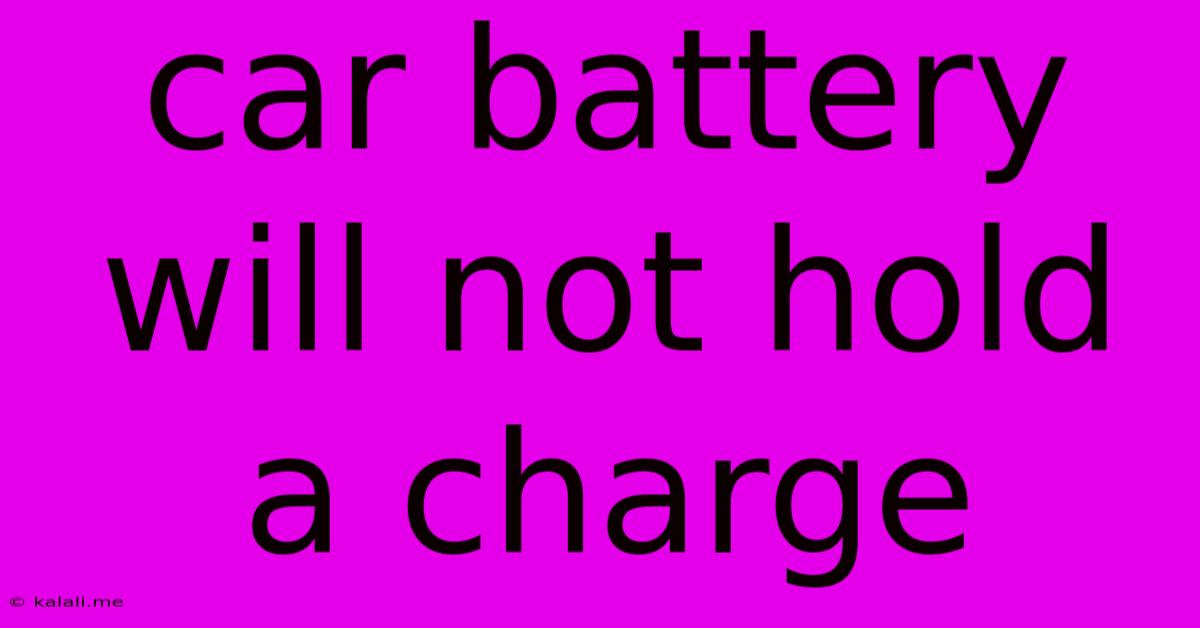Car Battery Will Not Hold A Charge
Kalali
May 21, 2025 · 4 min read

Table of Contents
Car Battery Won't Hold a Charge: Troubleshooting and Solutions
Meta Description: Is your car battery constantly dying? This comprehensive guide explores common reasons why your car battery won't hold a charge, offering troubleshooting steps and solutions to get you back on the road. Learn about alternator problems, parasitic drains, battery age, and more.
A dead car battery is a frustrating experience, especially when it happens repeatedly. If your car battery won't hold a charge, it's not just an inconvenience; it signals an underlying problem that needs attention. This article will guide you through the common causes and provide practical troubleshooting steps to pinpoint the issue and get your car running smoothly again.
Identifying the Problem: More Than Just a Dead Battery
Before jumping to conclusions, it's crucial to distinguish between a battery that simply needs a jump start and one that consistently fails to hold a charge. If you need to jump-start your car frequently, this indicates a deeper problem. A fully charged battery should easily power your car for several days, even without use.
Common Causes of a Car Battery That Won't Hold a Charge:
Several factors can contribute to a car battery's inability to retain a charge. Let's explore the most common culprits:
1. Alternator Issues: The alternator is responsible for charging the battery while the engine runs. A malfunctioning alternator, whether due to worn-out components or a faulty voltage regulator, prevents the battery from receiving the necessary charge. This is often the primary reason for a perpetually drained battery.
Troubleshooting: Have the alternator tested at an auto parts store or mechanic. They can perform a simple voltage test to determine its charging capacity.
2. Parasitic Drains: Even when your car is off, small electrical components can draw power from the battery. This "parasitic drain" can slowly deplete the battery over time, especially if there's a faulty component causing excessive drain. Examples include faulty interior lights, a malfunctioning radio, or a short circuit in the electrical system.
Troubleshooting: Use a multimeter to measure the current draw from the battery when the car is off. A significant drain indicates a problem needing attention. Systematically disconnect fuses one by one to identify the culprit.
3. Battery Age and Condition: Car batteries have a limited lifespan, typically 3-5 years. As a battery ages, its ability to hold a charge deteriorates. Extreme temperatures, consistent deep discharges, and sulfation (build-up of lead sulfate crystals) can further shorten its life.
Troubleshooting: Visually inspect the battery for signs of damage, corrosion, or bulging. A battery load test will reveal its health and capacity to hold a charge.
4. Corroded Battery Terminals: Corrosion on the battery terminals prevents proper electrical connections, hindering charging and causing power loss.
Troubleshooting: Clean the terminals with a wire brush and baking soda solution. Ensure a tight connection between the terminals and cables.
5. Loose or Damaged Cables: Loose or damaged battery cables can prevent efficient current flow, resulting in insufficient charging.
Troubleshooting: Inspect the cables for damage, looseness, and corrosion. Tighten loose connections and replace damaged cables.
6. Faulty Battery Charger (If Applicable): If you're using an external battery charger, ensure it's functioning correctly and delivering the appropriate charging voltage and current.
7. Excessive Short Trips: Frequent short drives may not allow the alternator sufficient time to fully recharge the battery.
Solutions and Prevention:
Once you've identified the problem, the solution will depend on the underlying cause. This might involve:
- Replacing the alternator: A vital step if the alternator test shows low output.
- Repairing or replacing faulty electrical components: Fixing parasitic drains requires identifying and addressing the source of the excessive current draw.
- Replacing the battery: If the battery is old, damaged, or failing load tests, a replacement is necessary.
- Regular battery maintenance: Cleaning terminals and ensuring tight connections will enhance battery performance.
- Longer drives: Allowing the alternator sufficient time to fully charge the battery after each drive.
By systematically troubleshooting the possible causes, you can effectively diagnose why your car battery won't hold a charge and implement the appropriate solution. Remember, addressing the underlying issue is crucial to prevent repeated occurrences and ensure your vehicle's reliable operation.
Latest Posts
Latest Posts
-
F Integrable Implies F Absolutely Continuous
May 23, 2025
-
How To Make Sure Different Meshes Move Together Blender
May 23, 2025
-
Discuss The Difference Between R And P
May 23, 2025
-
Turn An Image Into Two Distinct Colors Photoshop
May 23, 2025
-
Soql On User To Get User Type
May 23, 2025
Related Post
Thank you for visiting our website which covers about Car Battery Will Not Hold A Charge . We hope the information provided has been useful to you. Feel free to contact us if you have any questions or need further assistance. See you next time and don't miss to bookmark.